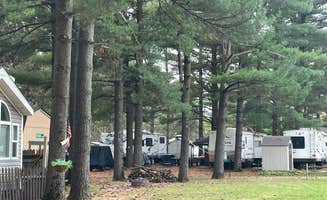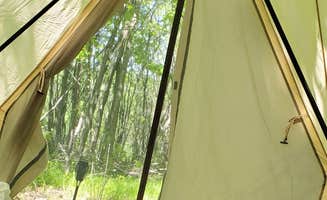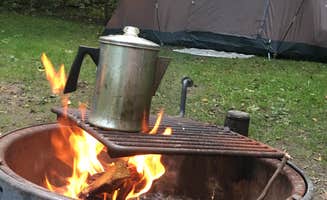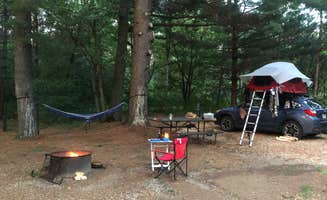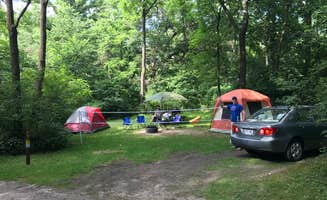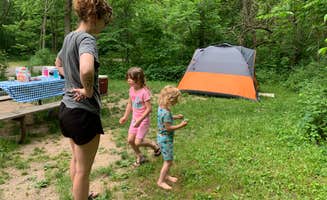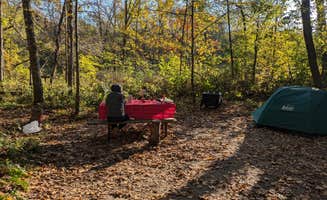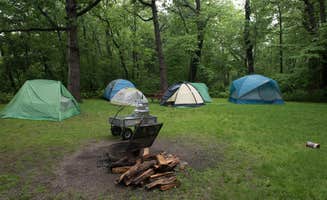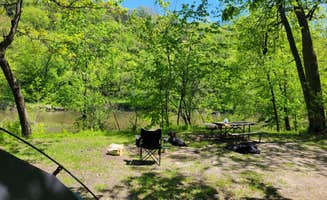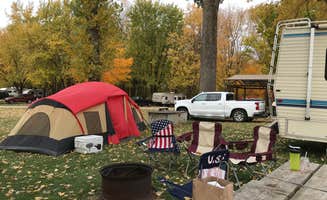The Mississippi River Valley near Kellogg, Minnesota sits at approximately 700 feet above sea level, nestled between limestone bluffs that rise 500-600 feet from the valley floor. This topography creates distinct microclimates with cooler ravines and warmer ridgetops affecting camping conditions. Primitive campsites throughout the region typically rely on hand pumps for water, with the water sometimes containing natural mineral content that gives it a slight rust tint.
What to do
Birdwatching access points: Merrick State Park offers excellent viewing platforms for migratory birds along the Mississippi. "This park has a ton of wildlife, nature area, & multiple points to access the water," notes one visitor. The park is especially known for eagles, as "this is a migratory route for thousands of birds."
Hiking trail connections: Carley State Park features interconnected trails for exploring the Whitewater River valley. "We attempted to do the hiking club trail, unfortunately the water levels were high and we weren't able to cross any of the river crossings. When the water levels are lower you are able to cross on giant concrete steps," explains one camper. The park offers "plenty of hills along the whitewater river, as well as a few places to jump in the VERY cold river."
Trout fishing lessons: Whitewater State Park organizes educational fishing opportunities for visitors during summer months. "We hiked, took trout fishing lesson, sat at the beach and had relaxing evenings by the fire," shares a camper who visited during Memorial weekend. The park provides various fishing access points, with one visitor noting there are "lots of spots for great fishing."
What campers like
Stargazing conditions: Aefintyr provides exceptional night sky viewing from their elevated campsites. "Beautiful campground with great amenities available. The hike to the site is steep but worth it once you get up there," writes one camper. They especially appreciated the "great view of the stars on clear nights!"
Site privacy: The primitive campgrounds in Richard J. Dorer Memorial Hardwood State Forest offer secluded sites with natural screening. One camper at Kruger Campground described it as "beautiful, secluded, affordable" and "a very pretty woodsy spot." Another camper noted it was "very affordable, a lot of space between sites so you feel like you have some privacy."
Low mosquito populations: Visitors to Whitewater State Park frequently mention the reduced mosquito presence compared to other Minnesota campgrounds. "Best part: very few mosquitoes!! (The cold, constantly moving water helps keep them away.) One of my favorite parks in the state of Minnesota," writes one reviewer. This makes evening activities more comfortable during summer months.
What you should know
Water quality varies: Some forest campgrounds have mineral-rich groundwater that may appear discolored. One camper at Kruger Campground in Wabasha mentioned "One negative was orange/rusty water from hand pump well." The water remains potable despite the appearance.
Train noise impact: Merrick State Park and other river valley campgrounds experience regular train traffic. "I grew up in a train town, so I loved hearing the trains in the distance, but if you were up at North camp, it would indeed be really loud," notes a camper. Another mentions, "Close enough that I don't think ear plugs would cut it for me."
Limited facilities: Most primitive campgrounds operate seasonally with basic amenities. Carley State Park, for instance, offers "no running water" according to campers. Kruger Campground is described as having "Pit toilets and a well, though we brought our own water supply."
Tips for camping with families
Cart-in site options: Frontenac State Park provides cart-in sites that create a primitive camping experience without long hikes. "There are 6 'cart in' sites, but they are about 1/2 mile away from the main campground and on the other side of the road. Park, put your gear in a cart, and walk about 1/4 mile to your site (C1 through C6)," explains one visitor who notes the "special rule for these sites: You have to pay $2 to use the showers at the main campground!"
Safe water play: Several campgrounds offer controlled water access for families. One visitor to Merrick State Park noted, "We stayed in one of the lower walk in sites. It had a wonderful view and easy water access. The shore consists of large rocks to prevent erosion so a canoe would have been difficult to put in but it was easy to carry my kayak into the water."
Wildlife viewing for children: Area campgrounds offer various wildlife spotting opportunities. Merrick State Park has abundant turtles according to one visitor: "Really enjoyed the views from our site. Turtle crossing signs were everywhere and they were right! I loved seeing all the turtles!"
Tips from RVers
Site length considerations: Nelson's Landing RV Park accommodates larger RVs with extended sites. "Sites tend to be very long and could accommodate even large-size Class A rigs. The 'driveways' are a mix of grass and gravel and were not very well defined," notes a visitor. Another mentions the park has "Easy pull-through and back-in sites. We easily backed in to our site."
Electric availability: Many primitive campgrounds lack hookups, but some offer limited electrified sites. Frontenac State Park has "Some electric sites ($31) in the first 2 loops; the map has an 'e' next to the site number and so does the post at the site," according to one reviewer. For winter camping, one visitor notes "the spaces were kept plowed with easy access to the electric boxes."
Dump station locations: Several campgrounds provide dump stations with variable seasonal availability. Big River Resort in Wabasha maintains "Very clean restrooms, showers, the area is so clean!" according to one visitor, though no specific details about the dump station facilities were provided.


